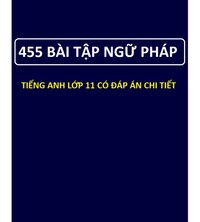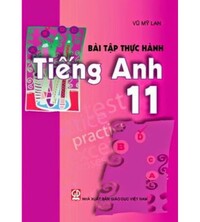Đề số 6 - Đề kiểm tra học kì 1 - Tiếng Anh 11 mới
Đáp án và lời giải chi tiết Đề kiểm tra học kì 1 - Đề số 6 - Tiếng Anh 11 mới
Đề bài
I. PRONUNCIATION
Choose the word which is stressed differently from the rest.
Question 1.
A. management B. stimulate
C. advertise D. overcome
Question 2.
A. attitude B. argument
C. relevant D. assistant
Question 3.
A. interact B. concentrate
C. counsellor D. influence
Choose the word whose underlined part is pronounced differently from the rest.
Question 4.
A. prioritise B. privacy
C. strive D. determined
Question 5.
A. wisely B. width
C. wisdom D. confident
Question 6.
A. possession B. discussion
C. profession D. decision
II. VOCABULARY & GRAMMAR
Choose a, b, c, or d that best completes each unfinished sentence, substitutes the underlined part, or has a close meaning to the original one.
Question 7. Regular dialogue and cooperation contribute to the………….. of peace and security in the region.
A. solution B. stability
C. maintenance D. integration
Question 8. The ASEAN Security Community (ASC)aims to ensure that countries in the region live at ………with one another and in a democratic and harmonious environment.
A. peace B. peaceful
C. peacefully D. peaceable
Question 9. Since I was a little child, my parents have encouraged me to voice my opinion. The underlined word has the CLOSEST meaning to__________.
A. take B. lend an ear
C. speak out D. make
Question 10. On July 28, 1995, Vietnam became ……….. seventh member of ASEAN.
A. a B. an
C. the D. Ø
Question 11. Everyone should act ………… in order to protect our environment.
A. responsible B. responsibly
C. responsibility D. irresponsible
Question 12. The population of ASEAN accounts ………… about 8.7% of the world's population.
A. of B. for
C. in D. from
Question 13. Teens should have the ability to................loneliness.
A. deal B. look afer
C. set up D. cope with
Question 14. The house was very quiet when I…………home. Everybody had gone to bed.
A. got B. get
C. have got D. was getting
Question 15. Laos and Myanmar were admitted …………ASEAN in 1997.
A. for B. of
C. to D. in
Question 16. He failed to keep her secrets, so she stopped being friends with him. He wished he hadn’t………….her trust.
A. reconciled
B. been in a relationship
C. broken up
D. betrayed
Question 17. ASEAN also try to solve the problems of ethnic tensions which might lead…………..civil war.
A. into B. away
C. off D. to
Question 18. The courses try to get young people to feel...............in applying new skills in order to live independently.
A. sure B. confident
C. excited D. interested
Question 19. One of ASEAN's objectives is to help people think about peace and ………….and do something about it.
A. origin B. justice
C. statistics D. record
Question 20. Her parents don’t think she should wear flashy clothes every day. The underlined word has the OPPOSITE meaning to________
A. fashionable B. sparkling
C. expensive D. casual
Error Identification.
Question 21. Playing the (A) football and doing (B) sports are excellent ways for (C) disabled children to get exercise (D).
Question 22. It (A) took (B) me five minutes (C) getting (D) to school.
Question 23. Since (A) I begin (B) school, I haven't had (C) much (D) spare time.
Question 24. When he arrived at (A) the furniture (B) shop, they had been sold (C) the table he wanted (D).
Question 25. I succeeded in (A) to find (B) a job, so my parents didn’t make (C) me go (D) to college.
III. READING
Choose the word or phrase among A, B, C or D that best fits the blank space in the following passage.
Generation gap refers to the difference in the ways of thinking and perception in the people of two different generations which results in behavioral differences, and sometimes, (26) between them. In other words, it is the difference in the thinking of the people of older and younger generations that creates the (27) of understanding between them. The most common example of generation gap is seen in the family between parents and their children. It is not only because of the gap in age but also because of the way parents (28) to a particular situation.
Advancement technology has led to the generation gap in this modern world. Children tend to spend most of their time with their digital devices and busy with social media that they do not discuss their problems with their parents. The Internet (29) solutions to most of the problems that children needn't ask their own parents for help, (30) the communication and leading to a generation gap.
Generation gap occurs not only between parents and children but also between teachers and students. Students are likely to enjoy the classes of an open-minded teacher, who shows mutual (31) to the students. The teachers, who tend to keep their students under unnecessary strict disciplines and practise hard ways to make them obey the orders, are usually disliked by the students. This narrows minded thinking, especially (32) in the teachers of the older generation, eventually creates a gap between the students and teachers.
Another difference is the use of technology. Young teachers tend to use more digital devices is class for their lessons that has a good (33) on the students. Students take more interest and participate actively in the class discussion. An old teacher has (34) - frequent use of electronic devices that makes lessons boring, which is not enjoyed by the students and it creates a gap between them.
To (35) the generation gap, parents or teachers must be close to their children. They should show interest and give time to the children, have open communication, and allow the child to feel free in all the situations.
Question 26.
A. opposition B. wars
C. conflicts D. sympathy
Question 27.
A. lack B. shortage
C. failure D. miss
Question 28.
A. behave B. react
C. change D. experience
Question 29.
A. sets B. allows
C. shows D. provides
Question 30.
A. reduce B. to reduce
C. reducing D. being reduced
Question 31.
A. respect B. politeness
C. benefit D. friend
Question 32.
A. watched B. met
C. seen D. considered
Question 33.
A. impact B. force
C. power D. act
Question 34.
A. fewer B. more
C. less D. much
Question 35.
A. give up B. reduce
C. make D. leave
Read the following passage and do the tasks below.
Southeast Asian Countries’ PISA Rankings 2012
Once every three years, 15-year-olds from around the world are tested on how well they know their reading, maths and science. This is called the Programme for International Student Assessment, or PISA for short. It is run by the Organization for Economic Coopertation and Development or OECD. Over half a million students from 65 countries and economies took part in PISA 2012. The result of the latest PISA 2012 had been announced on 3 December 2013. Only five out of ten ASEAN countries participated in PISA 2012. They were Indonesia, Malaysia, Singapore, Thailand and Vietnam.
- Singapore ranked 2nd in maths and 3rd in reading and science;
- Vietnam, entered PISA tests for the first time, ranked 8th in science, 17th in maths and 19th in reading;
- Thailand has been the participant in the PISA tests since 2000. It ranked 47 in science, 48th in reading and 50 in maths;
- Malaysia got 52th in maths, 53rd in science and 59th in reading;
- Indonesia got 61st in reading and got 64th in maths and science.
Singapore’s 15-year-old students came in the top five in every area. Vietnamese students scored very well on all three PISA subjects. Thailand, Indonesia and Malaysia ranked below average for the 65 countries assessed. The next administration of PISA is in 2015 and results will be reported at the end of 2016.
ASEAN CORNER by Kru Ekachai (www.aseancorner.blogspot.com)
Question 36. What does PISA stand for?
A. Programme for International Student Assignment
B. Programme for International Student Assembly
C. Programme for International Student Assessment
Question 37. How often is the PISA testing held?
A. Every 2 years
B. Every 3 years
C. Every 4 years
Question 38. What areas are tested on the PISA?
A. Reading, maths and biology
B. Reading, maths and science
C. Reading, science and geography
Question 39. How many ASEAN countries participated in the PISA 2012?
A. Five B. Six C. Seven
Question 40. Who are the participants of the PISA tests?
A. students
B. teachers
C. principals
IV. WRITING
Rewrite the following sentences using the words given.
Question 41. It is 2 years since Nam last went to the cinema
⟹ Nam has …………………………
Question 42. You should really speak to your parents when you have problems. (Cleft sentence)
⟹ It…………………………………
Question 43. That he decided to apply for the job surprised all of us.
⟹ His decision………………………
Question 44. Ann was selected to participate in the speaking contest. She was proud.
⟹ Ann was proud …………………………
V. LISTENING
Six people discuss what they prefer, a big family or a small family. Listen carefully and do the tasks below. Answer the following questions about the interview.
Question 45. Akane thinks big families are good because____.
A. she had a big family
B. she had a small family
Question 46. What does Jeff think you learn from a big family?
A. to share everything
B. to tell the truth
Question 47. Jeyong thinks big families are interesting _______.
A. because everyone is the same
B. because everyone is different
Question 48. Why does Ruth like big families?
A. They are more interesting
B. They laugh together
Question 49. What does Simon say about only children?
A. They get a lot of attention
B. They get whatever they want
Question 50. Why does Todd think small families are easier?
A. You can live in an apartment
B. Big families are expensive
Lời giải chi tiết
| Question 1 | D | Question 26 | C |
| Question 2 | D | Question 27 | A |
| Question 3 | A | Question 28 | B |
| Question 4 | D | Question 29 | D |
| Question 5 | A | Question 30 | C |
| Question 6 | D | Question 31 | A |
| Question 7 | C | Question 32 | C |
| Question 8 | A | Question 33 | A |
| Question 9 | C | Question 34 | C |
| Question 10 | C | Question 35 | B |
| Question 11 | B | Question 36 | C |
| Question 12 | B | Question 37 | B |
| Question 13 | D | Question 38 | B |
| Question 14 | A | Question 39 | A |
| Question 15 | C | Question 40 | A |
| Question 16 | D | Question 41 | |
| Question 17 | D | Question 42 | |
| Question 18 | D | Question 43 | |
| Question 19 | B | Question 44 | |
| Question 20 | D | Question 45 | B |
| Question 21 | A | Question 46 | A |
| Question 22 | D | Question 47 | B |
| Question 23 | B | Question 48 | B |
| Question 24 | C | Question 49 | B |
| Question 25 | B | Question 50 | B |
Question 41. Nam has not gone to the cinema for 2 years.
Question 42. It is your parents who you should really speak to when you have problems.
Question 43. His decision to apply for the job surprised all of us.
Question 44. Ann was proud of being selected to participate in the speaking contest.
Search google: "từ khóa + timdapan.com" Ví dụ: "Đề số 6 - Đề kiểm tra học kì 1 - Tiếng Anh 11 mới timdapan.com"







